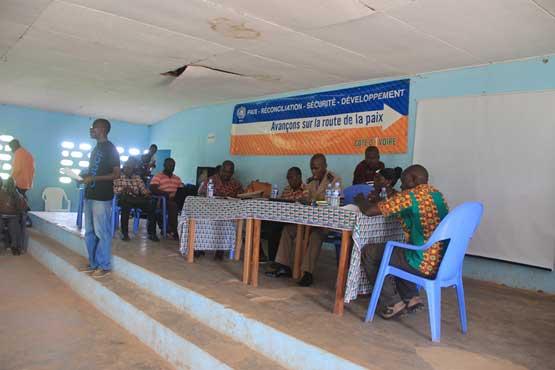
The objective of the meeting, which took place at the cultural centre in Bin Houye, was to reinforce the capacity of the community leaders of the region on the laws of chieftaincy and rural land ownership.
The training was dealt with several issues including the regulation and the functioning of the village, the status of traditional kings and chiefs and functioning of the House of kings and traditional leaders; the sources of land conflicts, the history or the method of access to land, the 1998 law on rural land and the law on the protection of women regarding rural land ownership.
These subjects were discussed by a panel of experts including the deputy prefect of Goulaleu, representatives of UNOCI's Human Rights Division, the Departmental Directorate of Agriculture and the Post Conflict Assistance Project ( CPAA).
Through a case study and role playing, participants put forward several solutions to issues related to chieftaincy. The election of the chief by consensus, the impartiality of the chief, the fair management of the property belonging to the village, were some of the suggested solutions.
Participants also recommended that the chief should be a development agent. In case of conflict on the traditional chieftaincy, a committee of wise men must work towards an amicable settlement.
With regard to rural land, participants recommended the establishment of the certificate and the land title to protect their land and respect for customary rights and the division of parcels of land.
The deputy prefect of Goulaleu, Clement Koffi Tanoh asked participants to implement the proposals. According to the deputy prefect, the application of the solutions will help people to peacefully resolve future conflict and strengthen social cohesion.
Problems related to rural land and chieftaincy are sources of endless conflicts
He expressed his gratitude to UNOCI for the training, stating: "It is indeed useful for you to come here and strengthen our capacity on these two texts since the problems related to land and chieftaincy are sources of endless conflicts," he said.
The First Deputy Mayor of Bin Houye, Clement Bian Koulai, for his part, thanked the United Nations for its actions to assist the sub-prefecture.
"Yesterday, it was UN Women who gave more than 50 million FCFA to a group of 15 women for their economic recovery and independence; and today UNOCI came to train us on chieftaincy and land laws. We are happy for all these initiatives that will contribute to the strengthening of social cohesion and lasting peace," he said.
The Coordinator of the United Nations Integrated Office in Toulepleu, Hélène Sylvie Zomahoun, for her part, outlined the issues of the session. According to her the aim of the training session was to promote peace and reconciliation and consolidate social cohesion by informing participants on chieftaincy and rural land laws, to offer responses to the participants' concerns on the management of rural land and the organization of villages and to propose solutions.






